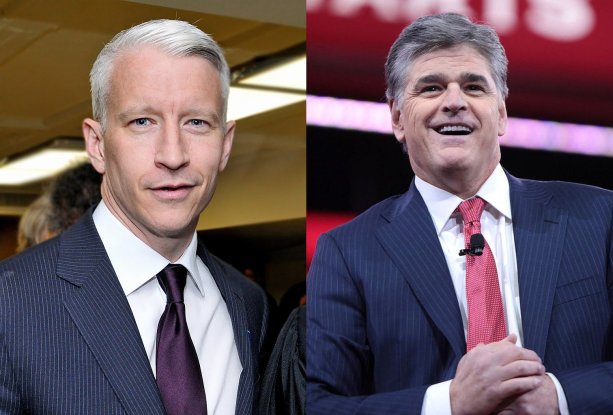The Difference Between News Coverage and News Interpretation

The “labeling issue” isn’t going to go away anytime soon. Barely has one “racist controversy” died down, here comes another. What happened last weekend?
Article Contents
- The fair city of Baltimore
- Pernicious entertainment
- Words and actions speak for themselves
- To label or not – that is the question
- Conflating the news
- No splitting hairs, please
- Anderson and his brother Sean
- A false analogy
- Let’s take cue from Wikipedia
1. The fair city of Baltimore
On Saturday, Donald Trump unleashed another tweetstorm or two, one of them targeting Elijah Cummings, an African American lawmaker who represents the city of Baltimore in Congress:
….As proven last week during a Congressional tour, the Border is clean, efficient & well run, just very crowded. Cumming District is a disgusting, rat and rodent infested mess. If he spent more time in Baltimore, maybe he could help clean up this very dangerous & filthy place
— Donald J. Trump (@realDonaldTrump) July 27, 2019
The reaction was predictable and followed the pattern of the preceding week’s outrage over the tweetstorm victimizing “The Squad” (four “progressive” Congresswomen of color).
Once again, Trump denied there was anything racist in his tweets:
….a look, the facts speak far louder than words! The Democrats always play the Race Card, when in fact they have done so little for our Nation’s great African American people. Now, lowest unemployment in U.S. history, and only getting better. Elijah Cummings has failed badly!
— Donald J. Trump (@realDonaldTrump) July 28, 2019
To no avail. The anchorman Victor Blackwell of CNN, himself an African American born and raised in Baltimore, while reporting (?) on the story, was struggling with tears:
The reaction to this video clip on YouTube has been polarized: as of writing this blogpost, the clip has 11 thousand “likes”, but 13 thousand “dislikes”. That is unusual: typically, viewers following a news outlet’s YouTube channel ensure a strongly positive rating for most video clips published through it.
Not this time! In comments, many YouTube viewers (they cannot all be racists, hopefully?) accuse Victor Blackwell of being a “crybaby” and even of “playacting”, shedding “fake tears” (meaning: planned and calculated in advance).
The judgment as to whether Blackwell’s tears were genuine or fake, must be left up to each viewer. One thing is certain: anyone who reads anything from a teleprompter (as most TV anchormen and anchorwomen do all the time) will by necessity come across as less genuine and sincere than one might desire, and may reap such (potentially undeserved) backlash as has been happening to Victor Blackwell these days. Teleprompters kill all naturalness of speech – as I observed in a blogpost back in 2016.
2. Pernicious entertainment
The week before last, in a much more recent blogpost written in Slovak, I said that as someone who had been trained as a linguist and who graduated in linguistics, I cannot support subversion of the traditional meaning of words (especially controversial, incendiary words), as captured by dictionaries, just to suit our agenda. Even if it’s the best-intentioned, noblest, most laudable agenda one can imagine!
If we subvert the meanings of words to suit our momentary needs, this just turns all of us into Lewis Carroll-like Humpty Dumpties – captivating artists and entertainers, perhaps, but not serious journalists (or thinkers).
As I argued, based on the definition of the term “racism” in the Merriam-Webster dictionary, it’s impossible to call Trump’s primitive (I’ll give you that epithet…) volley of tweets addressed at “The Squad” of four Congresswomen “racist”.
If we insist on calling that series of tweets “racist”, despite the content of those tweets having no relation to the definition of the term “racism” as captured in the dictionary, we are no better than Donald Trump. He keeps subverting the meanings of words all the time, just as it momentarily suits him, which was – for me, anyway – the main reason why I rooted for Hillary Clinton in the 2016 elections and why I, quixotically, called on the media to boycott Trump as far back as in August 2016, when he was still only a presidential candidate.
When a politician abuses language the way Trump has always done it, does this give us license to proceed similarly, as journalists? I don’t think so. The proper response, I think, would be to double-down on insisting on the proper, precise use of words of our language.
I consider Trump to be (business aside) primarily an entertainer (potentially a dangerous one), or possibly an “artist” (if you wish to flatter him and if you consider reality TV a modern form of art), whereas becoming a politician appears to have been an afterthought for him.
Now, if journalists abuse language, the standard meanings of words, in the same way Trump does it, they run the identical danger of being turned into entertainers first – while their journalistic duty (which is to deliver the news without bias) may only become an afterthought or get submerged entirely and forgotten in all the laudable agenda, emotional upheaval and moral outrage.
3. Words and actions speak for themselves
If political correctness is to become the new standard of public discourse, it will become increasingly difficult and finally impossible to criticize anyone (that is, to speak freely), because each of us belongs to this or that social group which might get offended by the criticism voiced (or the joke cracked – never mind its taste or lack of it).
If you voice a criticism of anyone who happens to be black (or yellow or red or green; or white!) – not criticism of their being a particular skin color, but of their random actions or words – you might automatically get labeled “racist”. If you voice a criticism of anyone who happens to be gay (not criticizing their being gay – just their actions or words unrelated to their sexuality), you might automatically get labeled “homophobic”. And if you voice criticism of anyone who happens to be… a woman (not criticizing their being a woman, but a random action or utterance of theirs), you might automatically get labeled “misogynist” – your dozens of mistresses regardless. In fact, the warped logic of political correctness manages to construe even this – an abundance of mistresses – as further evidence of alleged “hatred of women”: the perversion of the (primary) dictionary meanings of words thereby reaches its pinnacle, in that words are turned on their heads and declared to mean the opposite of what they traditionally used to signify.
You might say: there’s enough evidence in Trump’s conduct in past decades and especially the last few years to make the “racist” label justified for Trump’s tweetstorms in question. I say: not in news coverage, which is supposed to be free from bias. That is what the word bias signifies: that you judge an utterance or action based on your preconceived notions, which often rest on previous utterances and actions by the person being reported on. That’s all fine for an opinion piece, for news interpretation – but for bias-free news coverage, each utterance and action are to be described on their own merits (which does not mean divesting them of their context nor failing to measure them against the factual state of things).
Does an utterance contain, or an action involve, racism as currently defined in the dictionary? If yes, they are racist and may be described as such in bias-free news coverage, too. But if there seems to be no relation between a statement or action and the dictionary definition of the disparaging term, they are not to be labeled that way outside the opinion section – regardless of who uttered the questionable statement or performed the questionable deed, and what their past statements and actions may have been (which may well have deserved that same disparaging label back then – just not this time).
4. To label or not – that is the question
Last Friday, this Slovak news site published, in the MediaBrífing newsletter, a useful summary of reactions to the original “Squad” controversy. Are journalists supposed to label Trump’s tweetstorm about the four Congresswomen “racist” or not?
I side with the approach favored by the BBC, and promoted by Brian Ericson in his excellent commentary for the Washington Examiner, or in the equally superb opinion piece by Keith Woods, NPR’s vice-president for “newsroom diversity and training” (and yes, Woods, too, is African American), even though in composing it, Woods dissented from the stance his employer, NPR, adopted as a news outlet.
Just like Woods, I fear that the “labeling mania” may eventually lead to disaster – to the elimination of freedom of speech, and the erosion of democracy.
As I wrote (with hyperbole) in my blogpost the week before, I’m surprised it’s still permitted to make any sort of jokes in today’s America. After all, any joke could make someone feel offended (unless you wisely but sheepishly confine yourself to pulling your own leg). Shouldn’t stand-up comedy, for example, be outlawed straight up? Just to make sure no one’s (and no social group’s) feelings can possibly get hurt?
It appears that in the climate generated by the virus of political correctness, the “right not to be offended” (also known as “oversensitiveness”, “inability to accept criticism”, or “lack of a sense of humor”) takes precedence over that most sacred (or so I thought, as someone who grew up in an oppressive and censorship-driven Communist regime) of all rights – freedom of expression.
We may end up in an Orwellian situation where dictionaries themselves may get subverted over time, so as to accommodate all those secondary (and that’s putting it mildly) meanings of words promulgated by those fond of labeling other people’s words and deeds with inflammatory epithets.
For example, the Merriam-Webster dictionary might one day cave in, and expand its current and time-proven definition of “racism” to include an exceedingly broad and derived secondary meaning such as the following: words or actions that may help foster racist (see meaning 1) attitudes in society.
Can you feel how much, compared to the original definition, this second, broader definition relies on interpretation? To decide whether something may foster this or that is an act of judgment, prediction, supposition – it’s not a decision reached purely from facts, as desired in bias-free news coverage.
It’s undeniable that the second, broader, derived but currently only hypothetical definition of “racism” fits Trump’s tweetstorms to a T. That is what Trump’s tweets (and actions) may be accomplishing in their consequences (intended or not). Yet if our measuring stick is the current official dictionary definition of “racism”, Trump’s tweets themselves in these two most recent controversies can’t really be labeled “racist” – whether we like that or not.
5. Conflating the news
To pretend as if they can, is to confuse “news coverage” with “news interpretation”. “News interpretation” (also known as “commentary”, “opinion”) as such is fine – it’s a legitimate part of journalism. Although it helps when the opinions published by a news outlet offer a wide range of differing – contradictory, and dare we say “polemic”; at any rate: vigorously expressed – views on any topic at hand.
What is not OK is to commingle “news coverage” with “news interpretation”, so that they become indistinguishable from one another. Not just on “conspiracy websites”, but apart from them, especially on cable news networks in primetime, you are tempted to ask: are we getting any “news coverage” as such anymore? From all these celebrity news anchors – all these millionaires (no exaggeration)? (I naïvely used to think that the focus of a newscast should be the news themselves, rather than the TV superstar presenter; I used to assume that the news presenter, humbly retreating into the background as much as he or she can manage, would let the news speak for themselves.) It often feels as if the only (remnants of) “news coverage” we’re getting is embedded within “news interpretation” and/or entertainment.
That is why, for example, much as I enjoy watching YouTube clips of far-left (self-described “progressive”) The Young Turks – and while I like Cenk, Ana and the other TYT hosts on a personal level, and admire their civic courage and enthusiasm (and, oh yeah, I’ve even purchased an annual TYT subscription) – I consider TYT’s concept of “journalism” flawed. In reality, their channel is online entertainment (admittedly, with the noblest intentions behind it), with journalistic elements embedded within the entertainment, but in a way that makes it impossible to separate the two. For The Young Turks, “activism” and “journalism” have become synonymous, and I’m no fan of that conflation, either.
No wonder The Young Turks call each of their nightly three-hour programs a “show” (that term by itself, to me, indicates “trouble” and a lack of seriousness; as Cenk likes to introduce the programs: “Lots of fun tonight for everybody!”). But isn’t Anderson Cooper’s primetime program on CNN likewise a “show”? Yes, I often (half-)listen to Cooper’s audio podcasts as background noise over breakfast (due to time-zone shift between America and Europe), because I couldn’t possibly bear to watch the “show”, and I admit it’s usually entertaining (although highly repetitive), but that’s also what’s troublesome about it: it reminds me more of a raucous political circus than of a “news program”.
6. No splitting hairs, please
You may think I’m splitting hairs when I admit that Trump’s tweets “may foster racist attitudes in society”, but that that alone doesn’t make the tweets themselves racist. Yet I’m not splitting hairs – it’s the linguist (and translator, and proofreader) in me; someone who gets paid by their clients to use words in their precise meanings, and not haphazardly (let alone in inflammatory ways). But this shouldn’t only be a concern for those who underwent linguistic training – it should, rather, be a concern shared by everyone speaking in public space. Those are definitely journalists, but in a sense every citizen nowadays, given the easy availability of social media as a publishing platform for everyone.
Summary: calling Trump’s tweetstorm from the previous weekend “racist” wasn’t news coverage – it was news interpretation. Reporting (as the initial mobile notification from The New York Times did) that Trump published “comments condemned as racist” may seem unnecessarily wordy and cautious, a roundabout (“alibistic”, cowardly?) way of speaking, but it’s the right thing to do. In fact, it’s crucial for the health of public discourse – for preserving its rationality, so that it doesn’t consistently feel like the prelude to a (not just verbal) civil war. That NYT notification wasn’t flawless, either: it suggests universal condemnation of Trump’s comments, although as the later voting in Congress showed, that was far from the case. An even better, more fact-based wording in that notification, therefore, would have been “condemned by some as racist” or, given the undeniable scale of outrage, “condemned by many as racist”. That would be news coverage – no news interpretation.
May I mention another example of me supposedly (but not really) “splitting hairs”? Trump’s opponents accuse him of “promoting birther theories” about ex-President Obama not having been born in the US. Yet the evidence I have seen so far (and I’ve seen lots of it over the years) suggests Trump wasn’t really promoting that theory – he was “only”, shall we say, “asking questions and requesting evidence”. Saying that something may be problematic is not the same as saying that it is problematic, let alone proven false. To me, that’s not “splitting hairs”, but there’s a crucial difference between the two. Yes, Trump having so frequently asked the very questions may have been intentionally heinous and immoral and malevolent and Machiavellian on his part (and thus fit to be condemned in an opinion piece) – but asking questions is not the same as asserting (or promoting) anything.
If you said, “Trump many times suggested Obama may not have been born in the US”, that would be exemplary correct, factual diction of a newscaster. If you say, “Trump promoted the theory that Obama wasn’t born in the US”, you’re abandoning the diction of a journalist, replacing it with that of a propagandist with a palpable bias. And you’re misleading your viewers, listeners, or readers. As professionals for whom language is our primary working tool, let’s use words carefully, please – in their real and primary meanings (as understood by the general public).
7. Anderson and his brother Sean
Proponents of labeling (“racist, sexist, xenophobic, misogynistic…”) argue that it’s necessary to use labels because they put the politicians’ words and actions “into context”.
I maintain, as Keith Woods does, that it’s possible to introduce context without resorting to labeling. By all means, let’s communicate context – but let’s leave labeling up to our viewers and readers. It would be in the finest tradition of both American journalism and literature – say, of Ernest Hemingway (and he was originally, by no accident, a journalist!), who (such as in the novel A Farewell to Arms) managed to depict the most horrific carnage in human history without a single time labeling it as “horrific” (or any other label) and without expressing his moral outrage over it (although he doubtlessly felt lots of it).
Communicating context is part of news coverage – but labeling typically is not; labeling usually signifies moving on to news interpretation; it’s evaluation of news. Which, as mentioned, is perfectly fine as a component of journalism – as long as it’s clearly separated from news coverage. The trouble nowadays is, that much of the time it’s not separated at all.
Imagine if a nightly news show (there we go again…) like Anderson Cooper 360° was required to include in its chyron, throughout its entire runtime, an icon or symbol of news “Coverage” versus news “Commentary”. Out of 60 minutes of a typical Anderson Cooper newscast, for how many minutes do you think it would be possible to light up, with good conscience, that “Coverage” symbol in the chyron, instead of the “Commentary” symbol? 5 minutes, or 10 minutes out of 60 – if we’re generous? Perhaps if there’s a tragic plane crash somewhere, or another hurricane heading towards Florida, it might exceptionally be 30 or more minutes out of 60? Otherwise, if we’re being honest, the symbol “Commentary”, not “Coverage”, would need to be lit up for much of Anderson Cooper’s newshours.
If we were to allow a third possible symbol in the chyron, a combined symbol of “Coverage & Commentary”, it might well turn out that that is what constitutes the bulk of every iteration of Anderson Cooper 360°. In a way, however, this third combined symbol may be the worst of all: it’s the commingling of news and their commentary; of reporting facts and expressing one’s attitude towards/opinion on them, so that you can no longer tell one from the other, that is particularly pernicious. That is what Trump enjoys lambasting as “fake news”, and much as we abhor him, in this sense, his complaint may be justified.
But if this is so, what difference is there, really, between Fox News and CNN? Some might conclude, slim to none. Yes, Fox News propaganda is so raw and uncouth “it makes all the lampposts bend” (as the Slovak saying goes). CNN’s approach to make news coverage disappear in the mire of personal evaluation, moral stance and outrage, is a lot more refined and less “in-your-face”, but it’s essentially an analogy to “opinion hosts” on Fox News.
“Opinion host” is a Kafkaesque term to replace “news anchor” (someone of Walter Cronkite’s hallowed stature), but at least it’s honest. After all, it would be difficult to call someone like Sean Hannity a “news anchor”, given there’s little “news” left in his delivery. (Despite his – and Tucker Carlson’s, and Laura Ingraham’s, and formerly Bill O’Reilly’s… – show being aired on a TV channel confusingly dubbed Fox News.) It’s largely emotional bluster designed to excite the audience and sway it in a desired direction. Can CNN with a clear conscience state that no part of this description applies to their own output?
Hannity is the antithesis of journalism – you couldn’t possibly get further away from “straight journalism”. Someone like Brezhnev would have paid in gold for a television personality like that back in the times of Soviet Union. “Damn the facts – attitude and intentions are the only things that matter,” the comrades would nod approvingly.
8. A false analogy
Cenk Uygur of The Young Turks likes to repeat, as his mantra, that journalists should be objective, not neutral. Much as I disagree with Cenk’s overall take on journalism, I agree with that pronouncement. What Cenk means to say is: if journalists capture a politician say a lie, they should not fear to call it a lie in their news report. In this sense, journalists are “not neutral”, that is: they should not be required to “report both sides of a story” while refraining from concluding which of the two disagreeing sides is closer to the truth (if this can be factually established). As Cenk says, if the factual state of affairs can be ascertained and is indisputable, journalists should clearly say so, thus calling one side (sometimes both sides, or several sides, or all sides!) engaged in a dispute “wrong” or even “liars”.
I agree – that is all fine, and I still consider that to be part of news coverage, because it’s factually based. As long as you’re adhering to undisputed facts, you’re still engaged in news coverage – not in news interpretation. Concluding, based on facts, that one side (or several sides, or all sides) in a dispute was mistaken, or lying, is not evaluating the news, not interpreting it, commenting on it or expressing one’s attitude towards it – it can still be considered part of the straight delivery of news.
From this, however, the false analogy is being drawn by proponents of labeling, that – for example – calling Trump’s recent tweetstorms “racist” is just another such “dispassionate stating of facts” as reporting who was right and who was mistaken, who was telling the truth and who was lying, would be.
I believe that’s profoundly mistaken. If there’s anything factual in any of this, it’s the dictionary definition of the term “racism”. That is the fact we should all adhere to, and base our reporting on. Yes, as mentioned, even dictionary definitions may, over time, get subverted (or they perhaps already have been subverted in distant or recent past, whether we realize it or not) – but for now, the current definition of the term “racism” is the only fact we have in all these “racist” deliberations. And based on that definition, labeling Trump’s pair of tweetstorms “racist” is a – far-fetched and ill-willed – interpretation and evaluation of what happened. A legitimate interpretation, perhaps (each of us may choose to agree or disagree with it), but it’s not “straight reporting” – it’s no longer news coverage.
9. Let’s take cue from Wikipedia
“Ill-willed” (used here to mean, “imputing bad intentions to others”) is no small objection. Remember Wikipedia and one of its “fundamental principles” – “assume good faith” on the part of all fellow contributors to it? What self-destructive naïveté, you might say! Yet Wikipedia has turned out to be phenomenally successful.
Why not, for a change, try assuming good faith (until factually proven otherwise) on the part of all participants in the public and political discourse, too? Even in the case of “proven otherwise”, there are those words by the ancient philosopher who advised us to forgive not only such verbal transgressions “seventy times seven” and, if at all possible, start afresh with a clean slate, assuming good faith all over again.
For society to thrive, there needs to be dialog between those who disagree. How can you hope to engage in a dialog with anyone, if your very first step, before the discussion has even started, is to label (“racist, sexist, xenophobic, homophobic, misogynist, bigoted, fascist, irrational, unscientific…”) the other side with such offensive terms that the discussion is over before it even began?















